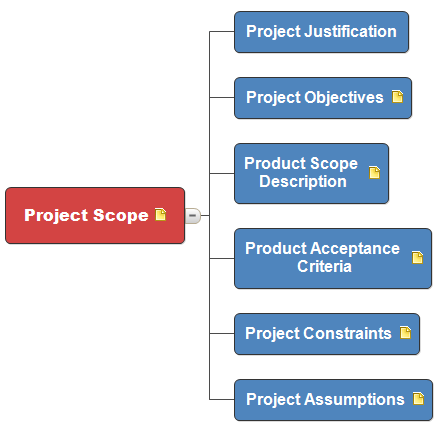Project Scope Homework Help
Project Scope
Project scope management is the management of process that is required to ensure that all work includes is necessary to complete work successfully. Under project scope management are three scopes.

1 Scope Planning – creating a project scope management plan that documents how the project scope will be defined, verified, controlled, and how the work breakdown structure(WBS) will be created and defined.
2 Scope Definition – developing a detailed project scope statement as the basis for future project decisions.
3 Create WBS – subdividing the major project deliverables and project work into smaller, more manageable components.
4 Scope Verification – formalizing acceptance of the completed project deliverables.
5 Scope Control – controlling changes to the project scope.
These processes interact with each other and with processes in the other Knowledge Areas as well. Each process can involve effort from one or more persons or groups of persons, based on the needs of the project. Each process occurs at least once in every project and occurs in one or more project phases, if the project is divided into phases. Although the processes are presented here as discrete components with well-defined interfaces, in practice they can overlap and interact in ways not detailed here. Process interactions are discussed in detail in Chapter 3.
In the project context, the term scope can refer to:
- Product scope. The features and functions that characterize a product, service, or result
- Project scope. The work that needs to be accomplished to deliver a product, service, or result with the specified features and functions.
This chapter focuses on the processes used to manage the project scope. These project scope management processes, and their associated tools and techniques, vary by application area, are usually defined as part of the project life cycle (Section 2.1),and are documented in the project scope management plan. The approved detailed project scope statement and its associated WBS and WBS dictionary are the scope baseline for the project.
A project generally results in a single product, but that product can include subsidiary components, each with its own separate, but interdependent, product scope. For example, a new telephone system would generally include four subsidiary components—hardware, software, training, and implementation.
Completion of the project scope is measured against the project management plan, the project scope statement, and its associated WBS and WBS dictionary, but completion of the product scope is measured against the product requirements. Project scope management needs to be well integrated with the other Knowledge Area processes, so that the work of the project will result in delivery of the specified product scope.
A project scope of work is the area of work which is agreed upon between the project manager/lead and the client. It includes all the details on what functions, objects, processes should be covered as a part of the project while setting the milestones, planning the deliverables etc.
1. Planning process: It is when output is created that work to capture define the work that needs competition.
2.Controlling and Monitoring process: It is related to document tracking, scope creep, tracking, approval and disapproval project changes.
3. Audit: The final process, includes an audit of a project deliverables and assess outcomes against original plan.
To define the scope of the project, it is important the following:
* Objectives
* Goals
* Budget
* Resources
* Tasks
* Sub-Phases
Example of a project scope of work for an ERP implementation includes-
1. Including all the business process configurations and transactions for Purchasing, Manufacturing, Inventory, Planning and Order Management functions/modules.
2. Requirement of custom reports for specific requirements.
3. Integration with certain other systems etc.
Project Management Tutorials
- Activity Based Costing
- Basic Quality Tools
- Benchmarking Process
- Cause and Effect Diagram
- Project Activity Diagram
- Project Charter
- Project Contract Types
- Project Cost Control
- Gantt Chart Tool
- PERT Estimation Technique
- Work Breakdown Structure
- Motivational Theories
- Project Kick-off Meeting
- Conflict Management
- Crisis Management
- Critical Chain Project Management
- Decision Making Process
- Monte Carlo Analysis
- Negotiation Skills
- Pareto Chart Tool
- Project Management Processes
- Project Manager Goals
- Project Portfolio Management
- Project Quality Plan
- Project Scope
- Project Management Software
- Project Time Management
- Capability Maturity Model (CMM)
- Critical Chain Project Management (CCPM)
- Critical Path Method (CPM)
- Earned Value Management (EVM)
- Enterprise modeling
- Event chain diagram
- Five Forces Analysis
- Graphical Evaluation and Review Technique (GERT)
- Inclusive Management
- Product Life Cycle
- Run chart
- Six Sigma
- Aggregate planning
- Budgeted Cost of Work Performed
- Business analysis
- Business Process Modeling (BPM)
- Event Chain Diagrams
- Gantt chart
- Henry Gantt
Project Management Case studies
- Project Management Methodologies
- Implementation of Project Management
- Project Management Cultures
- Project Management Organizational Structures
- Negotiating for resources In Project Management
- Project Management Estimating
- Project Management Planning
- Project Scheduling
- Project Execution
- Controlling Projects Case Study
- Project Risk Management
- Conflict management Case Study
- Morality and Ethics Case Study
- Managing Scope Changes Case Study
- Wage and Salary Administration
- Time Management Case Study
- Industry Specific Construction Case Study
Project Management Sample Assignments
Project Management Sample Solutions
Testimonials
Very affordable projects!! And that to submit before deadlines. Thanks for helping me in my database project and raising my grades. I have been able to secure good marks in my internal assessment only because of you. Read More

